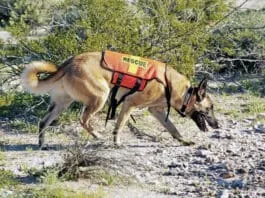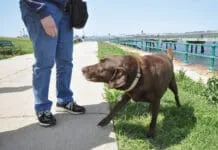Why Do Dogs Lay on Your Feet?
We think that dogs may lay their head on our feet as a way to show they love us by being close.
Recognizing Displacement Behavior in Dogs
Displacement behavior is when your dog does something normal, but at weird times that feel out of context due to your dog experiencing conflict or frustration.
How to Win the Body-Language Game
The key to dog body language is recognizing stress signals, and understanding what our own body language communicates to our dogs.
Are Dogs Ticklish?
Like humans, enjoyment of tickling sensations differs between dogs. Some love it. Others loathe it.
How to Tell If a Dog Is Depressed
Depression in dogs typically involves a significant behavioral change. Often starting with a gradual loss of interest in once-loved games. It can also start with a bang with aggressive or destructive behaviors.
How to Introduce a Cat to a Dog
There are millions of homes where cats and dogs live together in perfect harmony – mine included. How does that happen? Careful introductions of...
Why Dogs Sneeze When They Play
When a dog sneezes due to an irritation in her nose, the sneeze is forceful and may include nasal discharge. A social sneeze is small and delicate with no nasal discharge and very little head movement.
Do Dogs Have Periods?
Do female dogs have periods? No, dogs do not have periods. During one stage of the dog's reproductive cycle there is a bloody vaginal discharge that superficially resembles a period.
Dog Kisses: Is Your Dog Really Kissing You?
You either love it or hate it: the wet, warm sensation of a dog licking your face. Many of us seek out this kind...
Do Dogs Smile?
A well-accepted theory among dog behavior experts is that dogs smile because they know that we humans love it. We see our dogs lounging on the rug with their mouths hanging open, lips pulled back, looking utterly satisfied with themselves, and we go ga-ga with praise and pets. Dogs probably also observe their humans smiling at them and among themselves; they know people smiles are inherently positive (at the very least, benign), and that they can communicate amicability by miming that behavior.
Is My Dog Depressed?
When a dog is suddenly no longer interested in their favorite activities, whether it's playing Frisbee in the park or chasing squirrels in the backyard, most animal behavior experts will tell you to look for a physical explanation, not a mental-health recommendation. Taking your four-legged friend to the vet for a physical exam should always be the first response to what seems like depression. A change in behavior can usually be attributed to underlying physical conditions like arthritis or pain.
How Can You Know What Your Dog is Feeling?
Dog body language can be quite difficult to read, so it's important to consider the context when interpreting behavior. Not only do you need to consider the environment (for example, dogs will pant when they're hot, but also when they're stressed), you also need to look at all of the body parts together. Although many people attempt to correlate each type of movement with a specific emotion, the easier approach is simply to compare the overall pictures of a distressed dog to a happy dog.





















